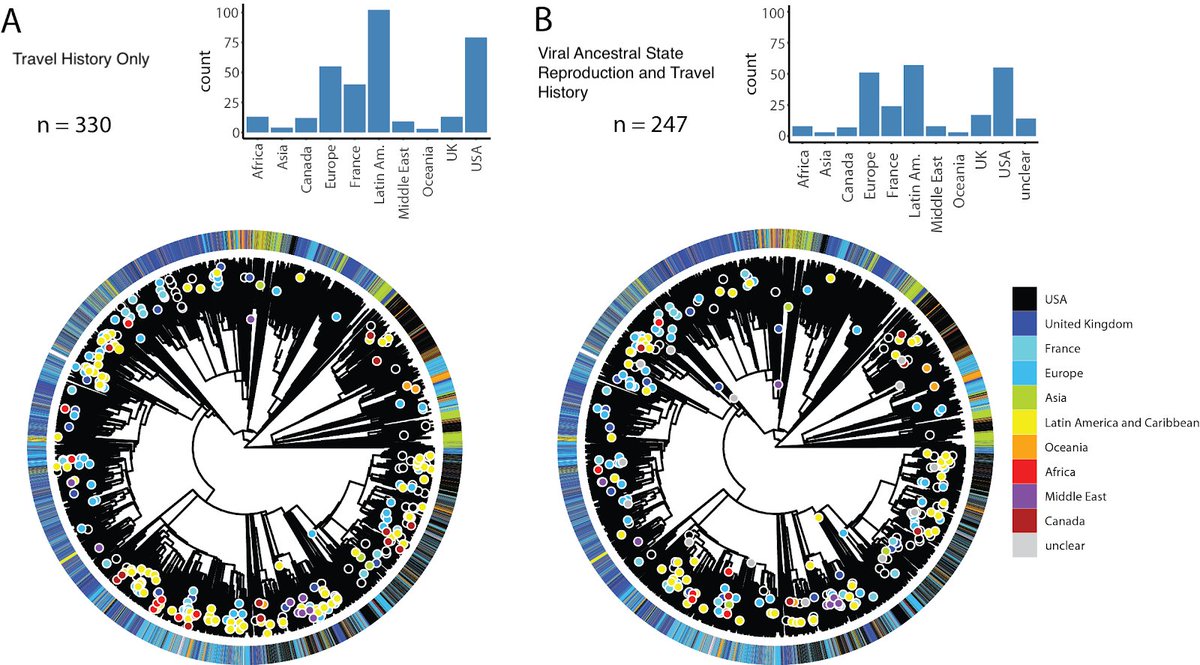I& #39;ll be referring to data from @McGillGenome study & @nextstrain
https://virological.org/t/genomic-epidemiology-of-early-introductions-of-sars-cov-2-into-the-canadian-province-of-quebec/553
1/11">https://virological.org/t/genomic...
1st I& #39;d like to acknowledge @bjesseshapiro @cl_murall & other amazing #scientists whose work & analysis should be relied on by policy makers & media alike.
See my summary of their phylogenetic study of #SARSCoV2 in Québec https://abs.twimg.com/emoji/v2/... draggable="false" alt="👇🏾" title="Rückhand Zeigefinger nach unten (durchschnittlich dunkler Hautton)" aria-label="Emoji: Rückhand Zeigefinger nach unten (durchschnittlich dunkler Hautton)"> https://twitter.com/DeNovo_Fatima/status/1308113245073534976
https://abs.twimg.com/emoji/v2/... draggable="false" alt="👇🏾" title="Rückhand Zeigefinger nach unten (durchschnittlich dunkler Hautton)" aria-label="Emoji: Rückhand Zeigefinger nach unten (durchschnittlich dunkler Hautton)"> https://twitter.com/DeNovo_Fatima/status/1308113245073534976
2/11">https://twitter.com/DeNovo_Fa...
See my summary of their phylogenetic study of #SARSCoV2 in Québec
2/11">https://twitter.com/DeNovo_Fa...
Analyzing samples from 734 Québec residents shows a global introduction of the virus into Québec. However, once the borders were closed & restriction were put in place, certain clades of the virus become more frequent.
What is a clade you ask? good question, keep reading https://abs.twimg.com/emoji/v2/... draggable="false" alt="👇🏾" title="Rückhand Zeigefinger nach unten (durchschnittlich dunkler Hautton)" aria-label="Emoji: Rückhand Zeigefinger nach unten (durchschnittlich dunkler Hautton)">
https://abs.twimg.com/emoji/v2/... draggable="false" alt="👇🏾" title="Rückhand Zeigefinger nach unten (durchschnittlich dunkler Hautton)" aria-label="Emoji: Rückhand Zeigefinger nach unten (durchschnittlich dunkler Hautton)">
3/11
What is a clade you ask? good question, keep reading
3/11
Think of clades as cousins. You & your cousin share the same ancestor (grand parents, great grand parents, etc.) & therefore your genes are very similar (this is why inbreeding is bad).
Viral clades are like cousin, they are closely related with a common ancestor
4/11
Viral clades are like cousin, they are closely related with a common ancestor
4/11
What are strains then? Another good question...
In the example of you & your cousins, if your family tree keeps growing w/ everyone reproducing w/ non-relatives, after many generations, you & your cousin, 100 times removed, are now markedly different.
same applies to viruses
5/11
In the example of you & your cousins, if your family tree keeps growing w/ everyone reproducing w/ non-relatives, after many generations, you & your cousin, 100 times removed, are now markedly different.
same applies to viruses
5/11
In Québec once travel restrictions were put in place, depending on a number of factors, including people& #39;s movements & contacts within the province, a few of those clades had the opportunity to spread more & therefore become more prominent.
6/11
6/11
Now you& #39;re probably wondering what if those prominent clades were more virulent?
And that& #39;s a brilliant question to ask; good job, you& #39;re starting to think like a #scientist https://abs.twimg.com/emoji/v2/... draggable="false" alt="👩🏾🔬" title="Woman scientist (durchschnittlich dunkler Hautton)" aria-label="Emoji: Woman scientist (durchschnittlich dunkler Hautton)">
https://abs.twimg.com/emoji/v2/... draggable="false" alt="👩🏾🔬" title="Woman scientist (durchschnittlich dunkler Hautton)" aria-label="Emoji: Woman scientist (durchschnittlich dunkler Hautton)">
Scientists have indeed looked at these scenarios & our current evidence shows that is not the case
7/11
And that& #39;s a brilliant question to ask; good job, you& #39;re starting to think like a #scientist
Scientists have indeed looked at these scenarios & our current evidence shows that is not the case
7/11
The clades that became prominent in Québec were also present in other part of Canada & the U.S.
If these clades were more virulent as @ArrudaHoracio claims, then we would see
 https://abs.twimg.com/emoji/v2/... draggable="false" alt="*⃣" title="Tastenkappe Sternchen" aria-label="Emoji: Tastenkappe Sternchen"> similar transmission dynamics in other regions
https://abs.twimg.com/emoji/v2/... draggable="false" alt="*⃣" title="Tastenkappe Sternchen" aria-label="Emoji: Tastenkappe Sternchen"> similar transmission dynamics in other regions
 https://abs.twimg.com/emoji/v2/... draggable="false" alt="*⃣" title="Tastenkappe Sternchen" aria-label="Emoji: Tastenkappe Sternchen"> those clades out competing other clades
https://abs.twimg.com/emoji/v2/... draggable="false" alt="*⃣" title="Tastenkappe Sternchen" aria-label="Emoji: Tastenkappe Sternchen"> those clades out competing other clades
8/11
If these clades were more virulent as @ArrudaHoracio claims, then we would see
8/11
Lastly, so far clinical data has NOT shown association between severity of symptom or positivity rate and a particular clade.
 https://abs.twimg.com/emoji/v2/... draggable="false" alt="*⃣" title="Tastenkappe Sternchen" aria-label="Emoji: Tastenkappe Sternchen"> Positivity rate = # of positive tests / total daily tests * 100
https://abs.twimg.com/emoji/v2/... draggable="false" alt="*⃣" title="Tastenkappe Sternchen" aria-label="Emoji: Tastenkappe Sternchen"> Positivity rate = # of positive tests / total daily tests * 100
9/11
9/11
This shows that the devastation seen last spring was the result of
 https://abs.twimg.com/emoji/v2/... draggable="false" alt="*⃣" title="Tastenkappe Sternchen" aria-label="Emoji: Tastenkappe Sternchen"> Early spring break
https://abs.twimg.com/emoji/v2/... draggable="false" alt="*⃣" title="Tastenkappe Sternchen" aria-label="Emoji: Tastenkappe Sternchen"> Early spring break
 https://abs.twimg.com/emoji/v2/... draggable="false" alt="*⃣" title="Tastenkappe Sternchen" aria-label="Emoji: Tastenkappe Sternchen"> Delayed governmental response
https://abs.twimg.com/emoji/v2/... draggable="false" alt="*⃣" title="Tastenkappe Sternchen" aria-label="Emoji: Tastenkappe Sternchen"> Delayed governmental response
 https://abs.twimg.com/emoji/v2/... draggable="false" alt="*⃣" title="Tastenkappe Sternchen" aria-label="Emoji: Tastenkappe Sternchen"> Years of bad policies w/ respect to eldercare, childcare & healthcare in general
https://abs.twimg.com/emoji/v2/... draggable="false" alt="*⃣" title="Tastenkappe Sternchen" aria-label="Emoji: Tastenkappe Sternchen"> Years of bad policies w/ respect to eldercare, childcare & healthcare in general
10/11
10/11
Disclaimer:
#Science in not a static set of facts. It evolves as we do more experiments, develop better methodologies & revise our thinking.
My assertions here are based on current evidence. Should our ongoing studies reveal a different outlook, I will update & revise.
11/11
#Science in not a static set of facts. It evolves as we do more experiments, develop better methodologies & revise our thinking.
My assertions here are based on current evidence. Should our ongoing studies reveal a different outlook, I will update & revise.
11/11

 Read on Twitter
Read on Twitter 3/11" title="Analyzing samples from 734 Québec residents shows a global introduction of the virus into Québec. However, once the borders were closed & restriction were put in place, certain clades of the virus become more frequent. What is a clade you ask? good question, keep readinghttps://abs.twimg.com/emoji/v2/... draggable="false" alt="👇🏾" title="Rückhand Zeigefinger nach unten (durchschnittlich dunkler Hautton)" aria-label="Emoji: Rückhand Zeigefinger nach unten (durchschnittlich dunkler Hautton)">3/11" class="img-responsive" style="max-width:100%;"/>
3/11" title="Analyzing samples from 734 Québec residents shows a global introduction of the virus into Québec. However, once the borders were closed & restriction were put in place, certain clades of the virus become more frequent. What is a clade you ask? good question, keep readinghttps://abs.twimg.com/emoji/v2/... draggable="false" alt="👇🏾" title="Rückhand Zeigefinger nach unten (durchschnittlich dunkler Hautton)" aria-label="Emoji: Rückhand Zeigefinger nach unten (durchschnittlich dunkler Hautton)">3/11" class="img-responsive" style="max-width:100%;"/>


